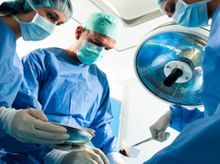Nephrectomy in Austria
Search and Compare the Best Clinics and Doctors at the Lowest Prices for Nephrectomy in Austria






Nephrectomy at Landeskrankenhaus Villach in Villach, Austria
Our partner clinics in are accredited by the following associations






































































































































No Time?
Tell us what you're looking for and we'll reach out to the top clinics all at once
WHY US?






































































































































No Time?
Tell us what you're looking for and we'll reach out to the top clinics all at once
What does a Nephrectomy Procedure Involve?
Nephrectomy can be performed through laparoscopic or open surgery. Both are performed under general anesthetic. Laparoscopic nephrectomy is usually performed to remove part of your kidney. Your surgeon makes small incisions in your abdomen to insert the laparoscope and small surgical tools. If your entire kidney needs to be removed, your surgeon will use open surgery. During open surgery, your surgeon makes one large incision on your abdomen or along your side.
How Long Should I Stay in Austria for a Nephrectomy Procedure?
You are required to stay in the hospital for two to five days. Plan to stay in Austria for around 10 to 14 days because you are likely to develop deep vein thrombosis after the surgery. You will also need to attend follow-up checkups, during which your surgeon will remove your stitches.
What's the Recovery Time for Nephrectomy Procedures in Austria?
The recovery period after a nephrectomy may take around three to six weeks. During your recovery period, you should avoid any strenuous activity and follow the post-operative instruction that your surgeon gives you. The instruction usually includes dietary restriction, exercise, and care for your healing wounds
What sort of Aftercare is Required for Nephrectomy Procedures in Austria?
Most people can function well with only one kidney. After the procedure, you can resume your daily routine and activities after 3 weeks. However, you will likely need checkups to monitor kidney function. These include monitoring your blood pressure, waste filtration, and protein urine levels. Since you only have one kidney, you will need to eat a healthy diet and engage in regular exercise to preserve normal kidney function.
What's the Success Rate of Nephrectomy Procedures in Austria?
Nephrectomy is generally safe and the risks are very small. Partial nephrectomy has about a 95% success rate. Nevertheless, the procedure carries potential risks, such as bleeding, injury to nearby organs, infection, post-operative pneumonia, and rare allergic reaction to anesthesia.
Are there Alternatives to Nephrectomy Procedures in Austria?
For certain illnesses, there are alternatives that do not need the removal of a kidney. The alternatives include renal embolization.
This information has been accurately sourced and verified by a medical professional for its accuracy, however, we strongly recommend you to consult with your doctor before pursuing medical procedures overseas.
